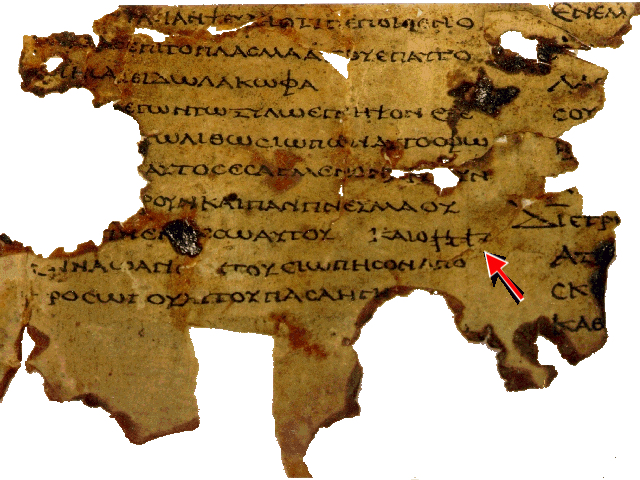Jesus may have been confined to Joseph of Arimathea’s tomb for a period of time no longer than about 26 hours.
Where Little Ones Splash: The Hebrew Roots Movement

The Hebrew Roots Movement has more to offer than merely rediscovering the biblical feasts and referring to New Testament personalities by their Hebrew names.
Sunshine For Everybody

Song of Songs Zuta is a rabbinic commentary on the Song of Songs. It may be characterized as exegetical and haggadic. In contrast to the better known Song of Songs Rabbah, Song of Songs Zuta is shorter in length. The words rabbah (great) and zuta (small) imply this contrast.
Threading a Needle

Over the past few years, I have reflected much on the phrases “to enter the Kingdom of Heaven” and “to inherit eternal life.” One important conclusion that I have reached from reading early rabbinic literature and Matthew, Mark, and Luke is that these are two independent concepts sharing a fuzzy area of overlap.
Written, Inspired and Profitable

The Bible provides minimal help for anyone trying to write a description of it for inclusion in a Statement of Faith. As a result, such descriptions typically claim more than the Bible discloses about itself.
Toward an Unclouded Vision of His Kingdom

In an effort to counter the risk we may be running of losing “the vision of the kingdom,” I will enumerate and comment briefly upon three optical aids for keeping it in focus.
Jehovah and PIPI

According to Jerome, those who were unfamiliar with Jewish customs tried to pronounce the Hebrew letters as if they were Greek letters. The result was quite a howler: they pronounced YHVH as PIPI!
Measure For Measure

Some of the things Jesus emphasized in his teachings stand as strong warnings to those who belong to the community of faith. Jesus made statements about not lapsing into prideful judgmentalism, and becoming centripetal in one’s thinking. Jesus taught that our attitude toward other people—outsiders, even sinners—must be like God’s.
Repentance: God Inhales

Blessing God as one who delights in repentance has rich theological implications. Nevertheless, this blessing runs the risk of inaccuracy by understating God’s reaction to repentance. He not only delights in it but displays peculiar patterns of behavior when under its influence.
Over and Under-Familiarity with Matthew 6:11

Hearing something repeatedly can diminish its significance. I suspect that this is particularly true of Scripture. Overfamiliarity with a biblical passage can contribute to its misunderstanding. Sometimes it can reduce a profound saying to nothing more than a cliché.
Jesus’ Sabbath Dispute with Pharisees in a Cornfield

The debate between Jesus and the Pharisees about plucking and eating corn did not concern labour on the Sabbath but concerned eating food which was allowed only to priests.
A New Perspectivist Response to Simon Gathercole’s Christianity Today Article

How do the results of a debate that raged more than three centuries after the New Testament was written affect the way most Westerners read Paul’s theology? Put briefly, Augustine effected a revolution in understanding what the human predicament is, how Christ saves us from it, and what the role of justification is within the larger understanding of salvation.
Where Seed and Thistle Grow

The interpretive approach of this essay assumes that Jesus’ frame of reference for the Parable of the Sower centered on the kingdom of heaven. Jesus emphasized repentance and grace, and their joint role as a catalyst for increasing God’s reign.
A Theology of Jewish-Christian Relations

Still today a famous German New Testament professor can say (as he did) to his students: “If you want to be a good Christian, you must kill the Jew in your heart.” I quote this professor’s words not because I am a Jew, but because he used the word “kill” as if it were a Christian virtue. Furthermore, the opinion that “you have to kill the Jew in your heart” is not unconnected with an important trend that existed in Christianity from its beginnings.
Rabbinic Reflections on Living Sacrifices at Romans 12:1

Paul mentions the living sacrifices without explanation, as if the readers would be familiar with the concept. Similar early rabbinic vocabulary suggests that Paul is referring to sacrifices which were given to the Temple but which were inappropriate for offering, because they were female instead of male or for other technical reasons. They could not be un-offered so, although they were sacrifices, they were kept alive as temple property till they became blemished, and any profit from them was for the Lord.
The Statistics behind “The Tomb”

Rather than being treated as liabilities to a statistical study, conjectured details are turned into historical givens and are even factored in as positive data. Consequently, most of the connections made in the documentary fall under the heading of “special pleading.”
Book Review: James Tabor’s The Jesus Dynasty

Tabor has an annoying habit of promoting remote possibilities into even possibilities, and then into probabilities.
What Is Measured Out in Romans 12:3?

In Rom. 12:3 pistis refers not to believing in God, nor to the adequacy of one’s service to God, but rather to the aspect and area of stewardship or responsibility that God has assigned to each believer.

